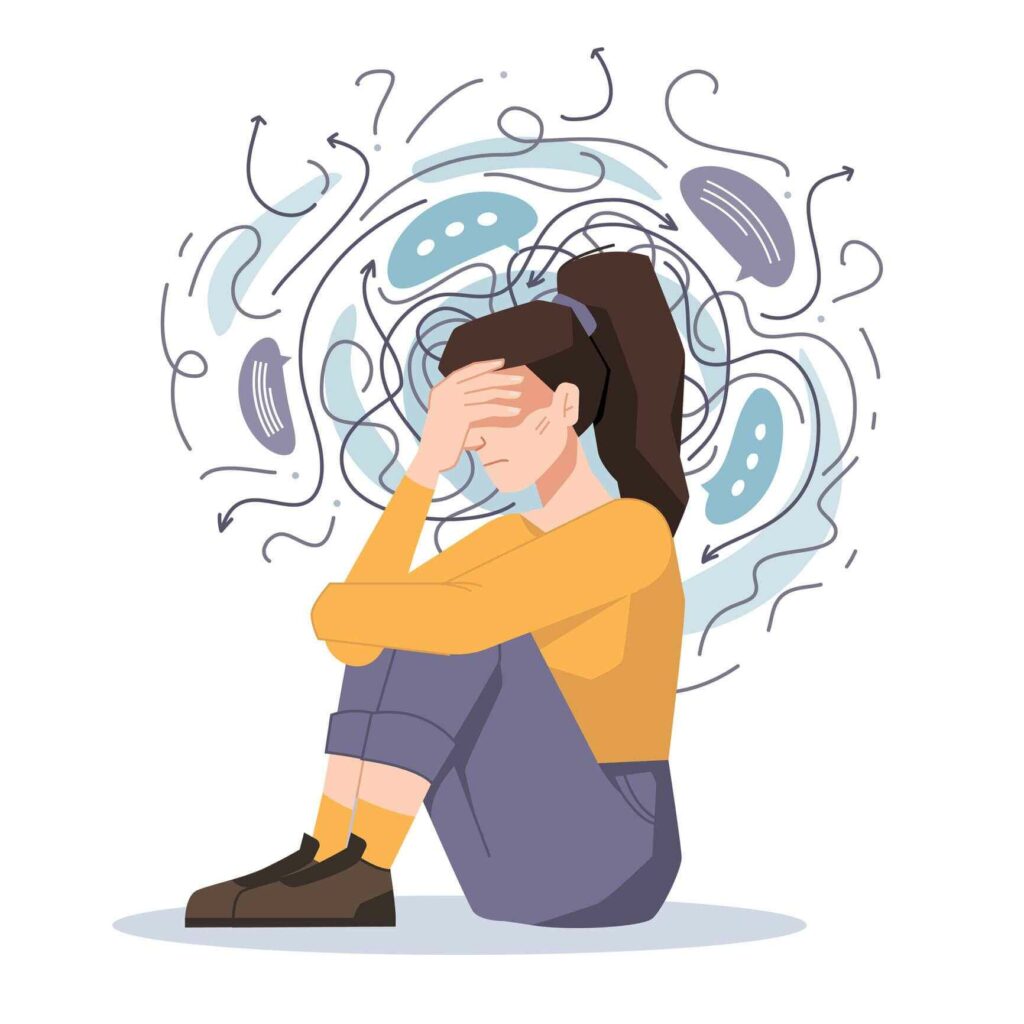If you are one of the estimated 40 million Americans who suffer from ADHD, there is a good chance that you also experience anxiety. And if you are one of the nearly 20% of American adults who suffer from anxiety disorders, there is an equally good chance that you also have ADHD. It makes sense, really – people with ADHD often have trouble focusing and staying on task, which can lead to feelings of anxiety and stress. In this blog post, we will discuss the link between ADHD and anxiety, and provide tips for how to address these common co-existing disorders.
Contents
Defining ADHD And Anxiety
 ADHD and anxiety are often comorbid, meaning they exist simultaneously. It can be difficult to tease out which symptoms belong to which disorder. But it is important to do so in order to develop the most effective treatment plan. However, both are different and have their own set of symptoms.
ADHD and anxiety are often comorbid, meaning they exist simultaneously. It can be difficult to tease out which symptoms belong to which disorder. But it is important to do so in order to develop the most effective treatment plan. However, both are different and have their own set of symptoms.
ADHD is a neurodevelopmental disorder that is characterized by problems with focus, impulsivity, and hyperactivity. Anxiety, on the other hand, is an emotional disorder that is characterized by feelings of worry, nervousness, and fear. In fact, ADHD is highly concerned with the “now” while anxiety is highly focused on the “future.”
Moreover, when a person has ADHD, they may act without thinking first or may have trouble finishing tasks. People with anxiety, on the other hand, tend to overthink things and obsess about potential worst-case scenarios. So, both are different though they may have some similar symptoms.
Link Between ADHD And Anxiety
There is a strong link between ADHD and anxiety. According to a study, 36 percent of adults with ADHD also have an anxiety disorder. Although some studies suggest that ADHD and anxiety may share a common genetic cause. It is also believed that the impulsivity associated with ADHD can lead to anxiety.
The link between the two disorders can be a vicious cycle. There are similarities and some differences also. Some of the similarities between ADHD and Anxiety are:
- Both disorders can cause problems with focus and concentration,
- Can make it hard to sit still or control your emotions,
- May lead to problems with sleep,
- Can cause low self-esteem.
The similarities can make it hard to distinguish between the two disorders. However, there are some key differences that can help in making a diagnosis. So, these differences are;
- ADHD is characterized by hyperactivity and impulsivity. While anxiety is characterized by excessive worry and fear.
- Anxiety can also cause physical symptoms like racing heart, sweating, and shaking. And ADHD is more likely to cause problems with organization and task completion.
- Also, ADHD is different from anxiety in that it is not caused by a specific event or worry. It is a chronic condition that can last for years.
So, this was a brief overview of the link between ADHD and anxiety. If you or someone you know is struggling with both disorders, it is important to seek professional help. With proper treatment, it is possible to manage both conditions.
Symptoms Of ADHD And Anxiety
 ADHD and anxiety are both disorders that can cause a lot of symptoms. But still, both the condition shares some common symptoms. Some of these include;
ADHD and anxiety are both disorders that can cause a lot of symptoms. But still, both the condition shares some common symptoms. Some of these include;
Trouble Focusing
ADHD and anxiety can both make it hard to focus. For people with ADHD, this may be because their thoughts are always racing. And for people with anxiety, this may be because they’re constantly worrying about things. Moreover, both of these conditions can make it hard to pay attention to things that are boring or not interesting.
Being Easily Distracted
Distraction is another common symptom of both ADHD and anxiety. For people with ADHD, this may be because they’re always thinking about other things. And for people with anxiety, this may be because they’re constantly worrying about what could happen. In fact, it is believed that anxiety can actually make ADHD symptoms worse. More often, people with ADHD are also more likely to have anxiety.
Forgetfulness
This is considered one of the most frustrating symptoms for people with ADHD. It can include forgetting to do things, losing track of time, or being unable to focus on a task. This can often lead to anxiety as well. Both disorders share some common symptoms, which can make it difficult to distinguish between them. Forgetfulness in anxiety is often more about worry and rumination than an inability to focus.
Restlessness Or Fidgeting
Restlessness and fidgeting is actually common symptom of ADHD. It’s one of the ways that people with ADHD try to release all their extra energy. Unfortunately, this can often be interpreted as anxiety by those who don’t understand the condition. It is in fact, however, a very normal part of ADHD. According to some studies, as many as 65% of people with ADHD also have an anxiety disorder.
Trouble Concentrating
People with ADHD and anxiety often have trouble concentrating. This is because their minds are constantly racing and they’re often thinking about several things at once. This can make it difficult to focus on any one thing for very long. The condition can also be accompanied by short-term memory problems. In anxiety, someone may have difficulty concentrating because they’re worried about what might happen or they’re constantly on the lookout for danger.
So, these are some of the ways that ADHD and anxiety can manifest themselves. If you or someone you know has these symptoms, it’s important to get help from a qualified mental health professional.
Treatment Options For ADHD And Anxiety
 The condition of having both ADHD and anxiety is not uncommon. In fact, it’s estimated that up to 60 percent of people with ADHD also have an anxiety disorder. So, treatment is important for people with this co-existing condition. There are a few key things to keep in mind when treating ADHD and anxiety.
The condition of having both ADHD and anxiety is not uncommon. In fact, it’s estimated that up to 60 percent of people with ADHD also have an anxiety disorder. So, treatment is important for people with this co-existing condition. There are a few key things to keep in mind when treating ADHD and anxiety.
- First, it’s important to understand that these are two separate disorders that need to be treated separately.
- Second, while there are some similarities in the way these disorders are treated, there are also some important differences.
- Third, it’s important to work with a qualified professional who can help you create a treatment plan that meets your unique needs.
With that said, let’s discuss some of the treatment options. These include:
Psychotherapy
Psychotherapy refers to a form of therapy that helps people manage their emotions and behaviors. It can be an effective treatment for both ADHD and anxiety. This is often done through talk therapy, which can help people learn new coping skills and ways of thinking about their experiences.
On the other hand, Cognitive-behavioral therapy (CBT) is a type of psychotherapy that has been shown to be particularly effective in treating anxiety. CBT can help people manage their anxiety by changing the way they think about it. And respond to anxious thoughts and situations.
For this, you can contact Mantra Care, the team of experts will help you with this. In fact, you can book a free consultation for more tips on how to manage your anxiety.
Medication
This is one of the most common treatments for both ADHD and anxiety. Medication can be very effective in reducing symptoms and helping people manage their condition. There are a variety of different medications that can be used to treat these conditions. Some of the Stimulants, such as:
These medications are often prescribed for ADHD. As this can help improve focus and concentration. Other medications include non-stimulant medications, such as:
These medications can be used to treat both ADHD and anxiety. However, they are often prescribed for people who cannot tolerate stimulants or have not had success with them. So, it’s important to work with a qualified professional to determine which medication is right for you.
Diet and lifestyle changes
 Diet and lifestyle changes can also be helpful in treating ADHD and anxiety. For example,
Diet and lifestyle changes can also be helpful in treating ADHD and anxiety. For example,
- eating a healthy diet
- getting regular exercise
- practicing relaxation techniques
- meditation can also be helpful
Lifestyle changes can help people manage their symptoms and improve their overall well-being. So, it’s important to work with a qualified professional to create a plan that meets your unique needs.
These are some of the key things to keep in mind when treating both conditions. If you have this co-existing condition, it’s important to seek treatment from a qualified professional. And, there are a variety of different treatment options available. So, you can find one that meets your needs.
Conclusion
To conclude, ADHD and anxiety are two very common mental disorders that often co-exist. Both conditions are highly treatable, however, it is important to seek professional help in order to receive an accurate diagnosis and treatment plan. If you or someone you know is struggling with ADHD and/or anxiety, please do not hesitate to reach out for help.
Moreover, it is essential to remember that you are not alone in this battle. There are many others who are struggling with similar conditions. Do not be afraid to ask for help or support from family, friends, or a professional. With the right treatment, you can live a happy and fulfilling life despite having ADHD and anxiety.
For more information, please contact MantraCare. ADHD is a neurodevelopmental disorder characterized by difficulty in paying attention, hyperactivity, and impulsivity. If you have any queries regarding Online ADHD Counseling experienced therapists at MantraCare can help: Book a trial ADHD therapy session


